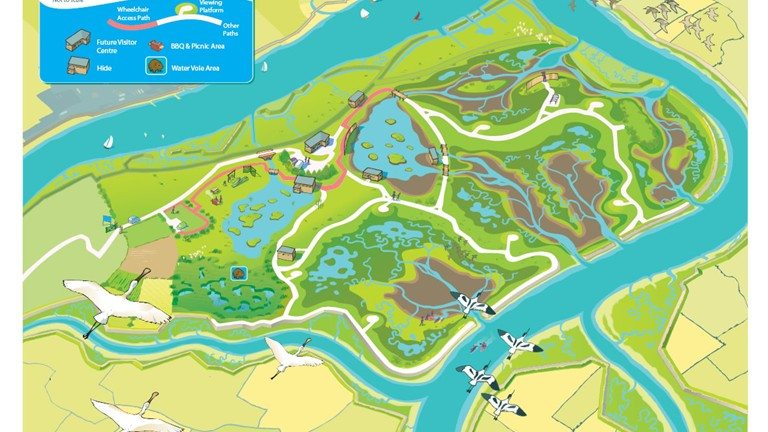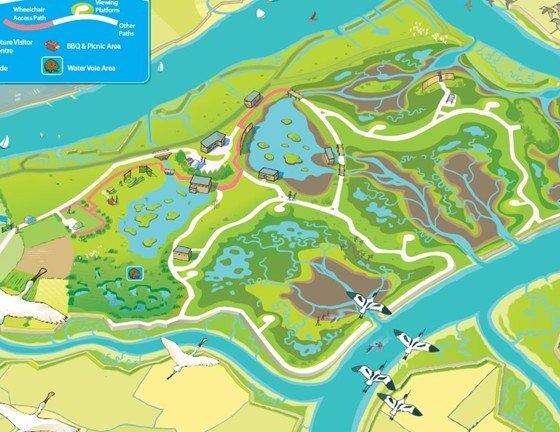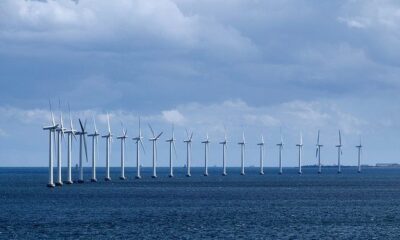

Environment
First stage of world-class project to help combat climate change complete: Wallasea Island Wild Coast project
The UK Government and the European Commission will officially open Jubilee Marsh today, marking the completion of the first phase of the RSPB’s Wallasea Island Wild Coast project – a world-class initiative in Essex in which conservation and business sectors have united to help wildlife and local communities adapt to continuing climate change.
With climate change predicted to have an increasingly severe impact on wildlife and people, Defra Environment Minister, Rory Stewart, and European Environment Commissioner, Karmenu Vella, will visit Wallasea Island to see how a unique partnership between the RSPB and Crossrail is creating a landscape helping to roll with the punches of climate change. It is hoped this project will inspire similar initiatives between business and conservation elsewhere in the UK and the European Union.
Over three million tonnes of material excavated from London as part of the Crossrail project was shipped to Wallasea to create Jubilee Marsh, named in honour of the Queen’s Diamond Jubilee, which was held when work on the marsh began in 2012. A five-tonne, seven-metre tall cutter arm from Tunnel Boring Machine Victoria, one of eight machines that created 42km of new tunnels under the capital will be unveiled as a permanent monument to this innovative partnership.
The Wallasea Island Wild Cost Project will safeguard local wildlife and communities from rising sea levels, including providing a habitat for the arrival of species from further south in Europe, such as the black-winged stilt, expected to colonise southern England as the climate continues to change. Additionally, the Kentish plover, a wading bird which became extinct as a nesting bird in the UK, could possibly return with the conditions being created at Wallasea. The Wallasea Island Wild Coast Project is a long-term project and will require a further seven million tonnes of soil to complete.
The Wallasea Island Wild Coast Project, north of Southend, is helping to tackle several climate change impacts, including creating conditions for colonising species, replacing habitat lost to rising sea levels and reducing flood risk to local communities. The project is also moving forward the science of landscape engineering by creating inter-tidal habitats on the largest scale seen so far in Europe.
Environment Minister Rory Stewart said: “The Wallasea Island project is a fantastic example of how creative thinking can bring development and environmental protection together, delivering win-win solutions for both. This kind of sustainable growth allows us to protect our natural environment while putting in place the infrastructure our country needs to grow.
“The Essex estuaries are one of our most beautiful natural assets and thanks to the vision and hard work of RSPB and Crossrail, the area will continue to flourish and support our diverse wildlife for decades to come.”
Karmenu Vella said: “The innovative project involving the RSPB and Crossrail shows the value of applying new environmentally-sound techniques. It applies a circular economy approach to build an extraordinary natural resource and add to Europe’s growing ‘Natura 2000’ network of protected areas.”
Mike Clarke is the RSPB’s Chief Executive. He said: “We need to care for our coasts as they are vital for people and wildlife. Preparing our low-lying coasts for rising sea levels is a major challenge for society.
“The scale of this challenge requires bold and inventive solutions. This partnership has proven that it’s possible to create the conditions for developing a world-class economy alongside a world-class environment. We hope that this way of working together will become a model for similar initiatives to recreate threatened habitats and protect threatened species elsewhere in the UK and across Europe.”
Crossrail’s Chief Executive, Andrew Wolstenholme, said: “Crossrail has helped deliver one of Europe’s most significant conservation projects on Wallasea Island. This trailblazing partnership with the RSPB is a key part of Crossrail’s sustainability strategy and demonstrates the benefits that can be achieved when the construction industry and environment groups work together.”
The RSPB’s vision has redrawn the map of south Essex. Originally farmland lying below sea level, Wallasea Island was increasingly difficult to defend from rising sea levels. Using over three million tonnes of unwanted soil from tunnels of the Crossrail project, in just three years, the level of the land has been raised and the sea defences breached to create a mosaic of inter-tidal habitats, reducing flood risk and recreating wildlife habitats that are continually under threat for the benefit of species like brent goose, dunlin and avocet.
A lagoon with a specifically designed island has been created which it is hoped will provide a major UK nesting site for the spoonbill – a relative of herons and ibises. While it’s anticipated that other lagoon areas will become nesting sites for black-winged stilts, a long-legged wading bird yet to establish itself properly in the UK, and for the Kentish plover. All three species are priorities for conservation across the European Union as they are listed on Annex 1 of the European Union Birds Directive.
Chris Tyas, Wallasea Island Project Manager, said: “Black-winged stilts are increasingly spending time in Britain from further south in Europe. In the last two years, the bird has nested in Britain, but it hasn’t established itself yet. However, we hope Wallasea Island will provide the bridgehead this bird needs extends its range on our side of the English Channel in the face of continuing climate change.”
The island is open to the public, who can now see Jubilee Marsh flooded, following a controlled breach of the sea wall on 11 July 2015.
In addition to Crossrail, the RSPB is delivering the Wallasea Island Wild Coast project alongside organisations including the Environment Agency, Defra and Natural England.






























